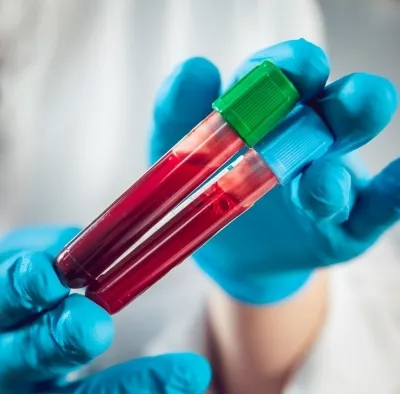Innovative Approach Promises Enhanced Cancer Monitoring via Blood Tests

Synopsis
Key Takeaways
- New blood test method enhances cancer monitoring.
- Whole-genome sequencing plays a crucial role.
- Significant advancement towards early cancer detection.
- High sensitivity and accuracy in detecting tumor DNA.
- Potential to transform cancer care practices.
New York, April 12 (NationPress) Researchers in the United States have discovered a novel technique that may facilitate more precise and accessible cancer monitoring through blood tests.
The investigation, conducted by experts from Weill Cornell Medicine and the New York Genome Center, demonstrated that this method could be instrumental in tracking disease status in patients post-treatment.
This technique, which utilizes whole-genome sequencing of DNA, signifies a crucial advancement towards the implementation of routine blood test-based screenings for early cancer diagnosis.
Dr. Dan Landau, a Professor of Medicine at Weill Cornell Medicine, stated, “We are now entering an era of affordable DNA sequencing, and in this research, we leveraged that capability to utilize whole-genome sequencing techniques that were previously deemed impractical.”
Published in the journal Nature Methods, the study concentrated on an error-correcting approach using a low-cost commercial sequencing platform.
This error-correction strategy capitalizes on the redundant information present in natural two-stranded DNA.
The findings indicated that it provided a remarkably high depth of coverage, a metric reflecting the quality of sequencing data, enabling the detection of extremely low concentrations of circulating tumor DNA. This also significantly enhanced the technique's accuracy.
The researchers suggested that blood-test-based “liquid biopsy” technology for early cancer detection and monitoring patients' cancer burden could revolutionize cancer treatment.
The team showcased the efficacy of their high-sensitivity, low-error approach by utilizing it to identify and evaluate very low cancer levels in patients with bladder cancer and melanoma using only blood samples.
Dr. Alexandre Cheng, a postdoctoral researcher, noted, “For instance, we were able to observe increases in circulating tumor DNA levels after treatment in patients whose cancers progressed or recurred, and declines in those levels in patients whose cancers exhibited full or partial responses.”










